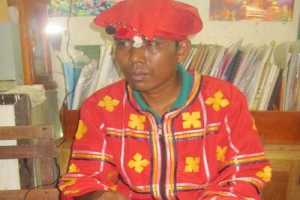Nov. 29,2016
Jer 33:14-16 Ps 25:4-5, 8-9, 10, 14
1 Thess 3:12-4:2 Luke 21:25-28, 34-3
 “The days are surely coming, says the LORD, when I will fulfill the promise I made to the house of Israel and the house of Judah.” [Jeremiah 33:14, NRSV]
“The days are surely coming, says the LORD, when I will fulfill the promise I made to the house of Israel and the house of Judah.” [Jeremiah 33:14, NRSV]
What was going on in the house of Israel and the house of Judah in the time of the Prophet Jeremiah? Let us take a look-back, balik-tanaw, at the context of this biblical time. What was going on?
Babylon, the ruling power at that time, had besieged Jerusalem, and the kingdom of Judah had fallen. The Temple of Solomon was destroyed and the people were banished. The few elite were brought to Babylon and the remaining population fled to Egypt. The Israelites of Jeremiah’s time had experienced land-grabbing, displacement, destruction of their culture and lives, and badly needing of God’s salvation from their oppressors and exploiters.
Now let us take a look at the context of our present time. What is going on?
The Asia-Pacific Economic Cooperation just very recently had its meeting right here in our shores. Its objectives include enabling economic growth, trade and investment cooperation among its 21 member-countries. What are some of the outcome of their just-concluded summit? They have forged more free market economic policies and pushed for the Trans-Pacific Partnership Agreement (TPPA) which they hope will rescue the US from its double-dip recession quagmire. They have pushed for their liberalization agenda which will only widen the chasm between the very few rich and the ever-growing number of poor. These policies will only allow for more wealth to be concentrated in the hands of a few corporations and oligarchs, while continuing to weaken Philippine agriculture and industry.
Of course, the basic sectors oppose this APEC organization and all that it stands for. This will only exacerbate today’s worst-ever crisis of unemployment and poverty. The effects of the last APEC meeting here in the Philippines around 20 years ago are still felt by the workers through exorbitantly low wages, the crisis of unemployment, and inhumane working conditions.
The farmers suffer from the massive importation of rice, vegetables, and sugar, even as the prices of their own products are lowered, their lands grabbed, and no sufficient services coming from the government.
Our Lumad and other indigenous sisters and brothers are displaced by the ever-encroaching mining and logging companies into their ancestral domain. They are harassed, raped, killed, and their schools and communities destroyed.
The neo-liberal policies of the APEC has only aggravated the Filipino and the world’s majority’s vulnerability to oppression and exploitation. The people of our time, just like in Jeremiah’s time, are experiencing land-grabbing, displacement, destruction of their culture and lives, and badly needing of God’s salvation from their oppressors and exploiters.
As sure as there is a fulfillment of God’s promise to the people of Israel in Jeremiah 33 for a righteous Branch to spring up, we are likewise assured that God’s people today shall experience “justice and righteousness in the land,” and that we “will be saved” and we “will live in safety”.
As the Psalmist has requested for the Lord’s ways to be made known, let us be open to the teaching and leading in truth of the God of salvation. Psalm 25 is a supplication for God’s protection and guidance. As church people, let us be a concrete manifestation of God’s steadfast love and faithfulness as we become one in solidarity with our sisters and brothers in their struggle for fullness of life. Let us match Paul’s enthusiasm, gratitude and joy to be working with them and being one with them.
The author of the Gospel of Luke is concerned with social ethics, the poor, and all oppressed groups. This passage in Luke 21 (also found in Matthew 24 and Mark 13) is known as the “Little Apocalypse” because it includes Jesus’ descriptions of future events, the use of end time language, and Jesus’ warning to his followers that they will suffer tribulation and persecution before the ultimate triumph of the Kingdom of God. Theories abound as to the meaning of this passage. Some say that this passage is a description of the Fall of Jerusalem. Some claim that it talks about the future. What is important is that it talks about the coming of the Son of Man and that when this happens, people must be ready.
Are we ready to face Jesus, follow him and take up his challenge to “bring good news to the poor, release to the captives and recovery of sight to the blind, to let the oppressed go free and to proclaim the year of the Lord’s favor”? As Jesus’ followers, are we willing to suffer tribulation and persecution as we work towards the ultimate triumph of the Kin-dom of God? God’s Reign of love, peace and justice is a time and place where the Lumad and all Indigenous People (IP) will attain their right to their ancestral domain and to self-determination, where there is land for the landless, where all have decent work with decent wages, where creation is respected and cared for, where there is genuine agrarian reform and national industrialization for God’s people. This is the promise of God for the people of God. Come, let us be the fulfillment of that promise!
Melinda Grace B. Aoanan
United Church of Christ in the Philippines
(UCCP)



